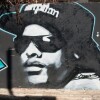'Straight Outta Compton' Movie: Can Hollywood Be Trusted?

It's hard to believe that it's been twenty-five years since NWA released its monster album "Straight Outta Compton" and put West Coast gangsta angst on the map. L.A. officially acquired a new kind of noir, ethnically and figuratively: the rotting underbelly of the sun-filled land of dreams moved from Raymond Chandler's Hollywood to Ice Cube and company's modest, almost nondescript SoCal town that now loomed big in the national imagination. Unlike Hollywood, though, people didn't exactly flock to Compton to see it for themselves. The public fascination with a black ghetto was maintained at a distance (as it generally is with all things black), through the music and videos and movies -- South Central, Boyz n the Hood, Menace II Society -- that transposed badass-L.A. from CD to screen. Compton and Hollywood met, in a fashion.
But things were quickly lost in the translation from street to pop culture commodity. The root angst of NWA, the grievances and social commentary that so animated "F--- the Police" and other cuts was upstaged by the more lurid details of gangsta life that the public took as a call to fashion, not a call to action. Bandanas, saggy pants, and gold bling worthy of Mafia dons became outlaw chic. The simmering rap rivalry between West and East Coast that culminated in real shoot-outs with real dead leading characters made gangsta-ism seem even more like a movie -- a Western, to be exact -- than ever.
In the meantime, distressed black neighborhoods like Compton continued to be distressed, though relatively few commercial hip-hop artists took on the subject directly. What looked for a minute like musical revolution became a new "urban" genre that seemed to generate controversy as a marketing strategy, not as a way to provoke thought.
Now, twenty five years later, director F. Gary Gray is making the movie "Straight Outta Compton," a look back at a moment in time that in retrospect was a real crossroads for us. NWA and its ilk provided the soundtrack for the Rodney King unrest four years later in 1992; in that context it was still protest music, a message from a forgotten, economically isolated community that had to shout -- crudely, at the top of its lungs -- in order to be heard. But ultimately the public only heard the volume, not the substance of the message.
Everybody wanted to be NWA, to affect its posture of scary black cool, but nobody wanted to be an activist or a policymaker demanding that the conditions of the inner cities change. Some people did raise the point, but virtually no one followed up. The truth is that the protests were running into the teeth of a conservative movement that had been gathering strength for decades, and the moral questions around race and economics raised by '92 -- the last ideological gasp of the '60s -- were no match for it. The conservative movement swallowed those concerns whole and moved on without missing a beat.
For me, it was cognitive dissonance that I still struggle with twenty-plus years later. I came on the scene as a new reporter in 1992 ready to chart the changes in South Central that I was reasonably sure would happen after such a moment. They didn't happen, not even modestly. I still looked for them. I am still looking for them.
On KCRW last week, I heard young black actors auditioning for roles in the forthcoming "Straight Outta Compton." They were all too young by far to have been around when NWA dropped its seminal work, but that hardly mattered; the ghetto zeitgeist is something they all understood very well, even if they hadn't exactly lived it.
The most surreal moment was listening to a casting director coach a hopeful 18-year-old boy into sounding as authentic -- i.e., as ghetto -- as possible. When he did that sufficiently, she praised him brightly, sounding for all the world like a teacher praising a student who spells all the words right. Compton and Hollywood meet again. Reality, alas, still can't get a foot in the door.



